In search of Morebath
I first picked up Professor Eamon Duffy's Stripping of the Altars when I was an undergraduate reading History at University College London. It was the mid 90's and the revisionist view of the Reformation had really begun to take a firm hold in Tudor scholarship. I remember just lapping up this compelling and refreshing account of the popularity of late medieval religion and the sad and distructive dismantling of that popular catholicism. It was great to read a book, a work of substantial scholarship, that not only accorded with something of my romantic vision of the compelling nature of medieval catholicism, but wasn't coloured by four centuries of Protestant and anti-Catholic propoganda. It still remains one of my all time favourite books.
The sequel, if you like, to the Stripping of the Altars, is a book called The Voices of Morebath, which was first published out in 2001.This is the account of the impact of the Tudor Reformation on a small parish on Exmoor in Devon, seen through the lense of the parish churchwarden's accounts. The accounts were kept by a man called Sir Christopher Trychay, who would serve as vicar of Morebath for fifty four years. He was vicar all through the period of turmoil, arriving in 1520 as a young fresh-faced catholic priest and dying in post in his eighties, as the protestant minister. The accounts are not just a list of expenses of office, Trychay overlayed them with his own commentary and asides, which provide ga rare glimpse of parish life in the Tudor period.
During the first twenty years of his ministry Trychay put a good deal of effort into re-enlivening the devotional life of this remote parish. He fostered the development a cult to the Exeter saint St Sidwell, which was focused on an image of her that he placed on the side altar in the north aisle. Together he and the parishioners worked towards a thorough restoration and requipping of the church building. Work included a new rood screen, a new rood and the renovation of all the images. Duffy tells us that all was done with love and great devotion. One of the most compelling and heartbreaking details of the account concerns a set of new black vestments. For twenty years Trychay had saved up for a new set of black vestments for use at requiems, putting his own money into the fund and in July 1547 he finally raised enough money to get them. However, Henry VIII had died earlier in 1547 and his death signalled the first phase of the Protestant Reformation and all the vestments and ornaments so lovingly bought, including the new black vestments, were soon to be swept away for ever.
What for me is so compelling and moving about Duffy's book is what it tells us of Trychay's attitude to the Reformation. Throughout the uncertain years that followed, with the demands of reform and counter reform, Trychay stays faithful to his parishioners. He doesn't resign his living, he stays put and weathers the storm with them. He is quietly nonconformist when he can be and equally conformist when need arises. There is a sense that his loyalty to his people and their place overides his own personal conviction - his thoughts and actions are always corporate, never individual. Duffy lays bare the odd contemporary assertion, which has been voiced by commentars of this blog, that the church buildings of medieval England were somehow stolen from the Catholic church and handed to the robbing Protestants of the Church of England in a grand coup. Duffy makes it plain that this is not so. In the reign of Elizabeth, the priest saying the communion service at the table was often the same priest who had said mass at the altar during the reigns of her father and sister. The people responding to the new service of Matins and Evensong, were the same people who would eagerly see Our Lord lifted high above the priest's head at the altar during mass. For the most part the people of England, both the clergy and the people, quietly conformed to the demands of the Reformation. Priests like Trychay, inwardly conservative in religious matters, outwardly conformed and they stayed faithful and loyal to their flock. What else could they do?

I was very pleased to be able to visit Morebath last week and below are one or two photos of the church. Sadly much of the church was rebuilt by William Butterfield in the 1870s and the only part that Trychay would recognise is the fifteenth century north aisle with its barrel roof. It was at the east end of this aisle at the altar of Jesus that Trychay placed the new cultic image of St Sidwell and it was here that he said his daily mass, while he could. Of course all sign of that altar has been swept away.

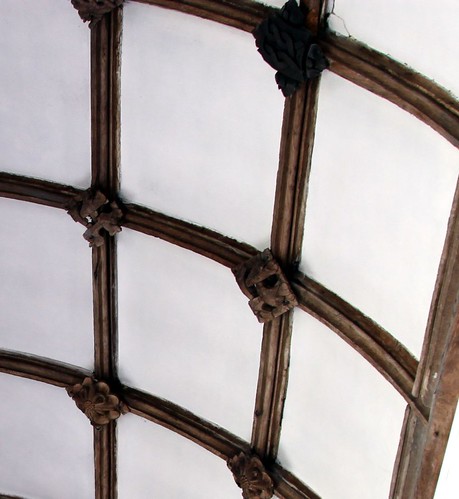
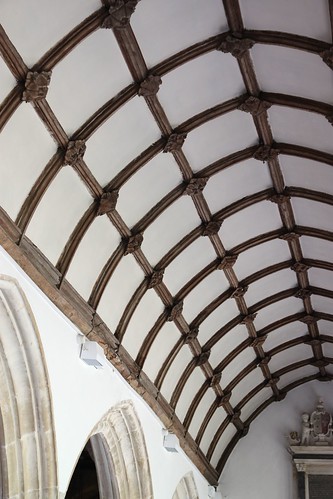
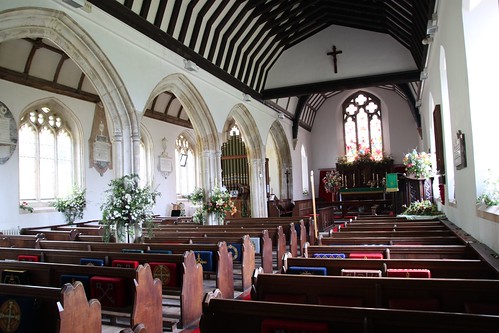
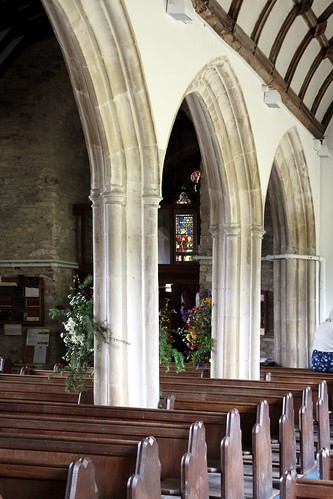
The sequel, if you like, to the Stripping of the Altars, is a book called The Voices of Morebath, which was first published out in 2001.This is the account of the impact of the Tudor Reformation on a small parish on Exmoor in Devon, seen through the lense of the parish churchwarden's accounts. The accounts were kept by a man called Sir Christopher Trychay, who would serve as vicar of Morebath for fifty four years. He was vicar all through the period of turmoil, arriving in 1520 as a young fresh-faced catholic priest and dying in post in his eighties, as the protestant minister. The accounts are not just a list of expenses of office, Trychay overlayed them with his own commentary and asides, which provide ga rare glimpse of parish life in the Tudor period.
During the first twenty years of his ministry Trychay put a good deal of effort into re-enlivening the devotional life of this remote parish. He fostered the development a cult to the Exeter saint St Sidwell, which was focused on an image of her that he placed on the side altar in the north aisle. Together he and the parishioners worked towards a thorough restoration and requipping of the church building. Work included a new rood screen, a new rood and the renovation of all the images. Duffy tells us that all was done with love and great devotion. One of the most compelling and heartbreaking details of the account concerns a set of new black vestments. For twenty years Trychay had saved up for a new set of black vestments for use at requiems, putting his own money into the fund and in July 1547 he finally raised enough money to get them. However, Henry VIII had died earlier in 1547 and his death signalled the first phase of the Protestant Reformation and all the vestments and ornaments so lovingly bought, including the new black vestments, were soon to be swept away for ever.
What for me is so compelling and moving about Duffy's book is what it tells us of Trychay's attitude to the Reformation. Throughout the uncertain years that followed, with the demands of reform and counter reform, Trychay stays faithful to his parishioners. He doesn't resign his living, he stays put and weathers the storm with them. He is quietly nonconformist when he can be and equally conformist when need arises. There is a sense that his loyalty to his people and their place overides his own personal conviction - his thoughts and actions are always corporate, never individual. Duffy lays bare the odd contemporary assertion, which has been voiced by commentars of this blog, that the church buildings of medieval England were somehow stolen from the Catholic church and handed to the robbing Protestants of the Church of England in a grand coup. Duffy makes it plain that this is not so. In the reign of Elizabeth, the priest saying the communion service at the table was often the same priest who had said mass at the altar during the reigns of her father and sister. The people responding to the new service of Matins and Evensong, were the same people who would eagerly see Our Lord lifted high above the priest's head at the altar during mass. For the most part the people of England, both the clergy and the people, quietly conformed to the demands of the Reformation. Priests like Trychay, inwardly conservative in religious matters, outwardly conformed and they stayed faithful and loyal to their flock. What else could they do?

I was very pleased to be able to visit Morebath last week and below are one or two photos of the church. Sadly much of the church was rebuilt by William Butterfield in the 1870s and the only part that Trychay would recognise is the fifteenth century north aisle with its barrel roof. It was at the east end of this aisle at the altar of Jesus that Trychay placed the new cultic image of St Sidwell and it was here that he said his daily mass, while he could. Of course all sign of that altar has been swept away.





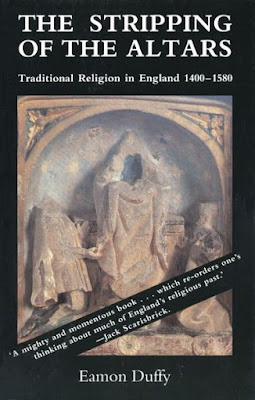


Comments
It would be nice if the parish saw fit to erect a small statue/shrine to St Sidwell as a fitting memorial to Sir Christopher's devotion both to the Saint and to his parish .......
One can always hope :-)
Thanks for the pics; it is nice to see some further details. I do very much enjoy your blog.
Fr. Dan Graves
Thornhill, Ontario
I, in particular, will remember him when I next celebrate a general requiem.
England never broke communion with the See of Rome. It was Rome acting to further the political ambitions of the King of Spain who excommunicated Elizabeth I and broke communion with the Church of and in England.
Secondly while Rome has tried to appropriate the word Catholic to itself, it continues to be less than that in separating itself from the clear teaching of the New Testament and the theological decrees and canons of the earliest universally recognized General Councils.
Let me respond by asking you a question - or perhaps a series of questions. When Paul VI instituted his reform of the Roman liturgy so that one day, Roman ministers were saying their office and celebrating the Eucharist in Latin and the next doing so in a language understood of the people, was there an ontological difference? I don't think so. And I am sure that every Roman prelate from the pope to the most obscure bishop was sure that they held the same office as they had the day before.
Many year ago I engaged in a debate with the head of the "Evangelical" study house in Oxford over the Book of Common Prayer's theology of order. He was insistent that the English reformation meant that a new theory of ministry and a new ministry was introduced with Cranmer's Ordinal. I pointed out that the first English Ordinal made a very interesting choice of words. The medieval pontificals ordained to the "presbyterate," the classic term going right back to the Greek New Testament. But that term was not good enough for Cranmer, his suffragans, the convocations or parliament, and the words chosen and used were "priest' and "priesthood." Now unless your Anglican brethern are really functionally illiterate, one wonders why they have allowed themselves to be ordained priests when what they wanted to be was "protestant ministers" in the continental and Calvinist model? To have done so is an open admission of something so shocking, so lacking in ordinary morality, that it is difficult to even imagine that anyone claiming to be a Christian would do so. But unfortunately, it has happened and continues to happen.
I think this is all an issue of theological perspective really. I see your point, but surely the liturgical and theological shift from missal to prayer book, particularly to the 1552 prayer book, was rather greater than the shift between the classic Roman rite and the Paul VI missal. I'm still no closer to finding an answer to how to phrase this in a way that does justice to what I believe to be the reality of the continuity and the reality of change and is not confusing to the majority of people who read this blog.
As for how Anglican clergy perceive their orders. I agree with you that it is clear that clergy in the Church of England are ordained to the threefold ministry, and to the priesthood. Are you implying that Cranmer's use of the word 'priest' instead of 'presbyter' suggests a high view of the ordained ministry? Surely this is just an issue of semantics. Though rapidly diminishing through liberal pressure we are still in a situation where we can talk of 'theologies' rather than 'theology' in the Church of England. There are 'priests' in the Church of England, who reject the notion that they are sacramentally ordained, who reject the whole notion that at ordination a sacrament is conferred. I'm unsure of what they think they are doing. They do, however, mark their dissent from the notion of 'priesthood' visually during the ordination rite. By wearing tippets rather than stoles at their ordinations. I always find that rather funny given the medieval catholic origins of the tippet. If they were to interpret the situation at Morebath, they may not see the continuity quite as we do. No doubt they would emphasise the good of the rupture, whereas I see the sadness in it.
Although we naturally touch on issues of theology here, this is firstly and foremostly an art historical blog. Despite reading a lot of quite boring and aggresive polemic to the contrary, this is a heritage that we all share. I hope you will agree that we may not be reconciled theologically, but we can at least be united through beauty.
Anyway, I shall say no more. I have no wish to get into a fight.
I am not here to start a scrap but primarily because I enjoy intensely viewing the artistic heritage of the English Church through the very perceptive eyes of Father Barton. That said, neither am I going to back away from one if I am attacked. As Father Barton pointed out, I am an Anglican, Anglican and unashamed, because I not only know our formularies and our history, but that of the Roman Church as well. I could serve mass in Latin and had memorized the Roman Eucharistic canon a number of years before I knew the Book of Common Prayer or Anglicanism existed. To please my Roman uncle (by birth in the city and religion) I served mass for a cardinal archbishop who did his best to get me to consider a vocation. He had already picked out my college and seminary in Belgium, but at that point I was headed to the military, marriage and fatherhood.
When I was a cadet we had an honor code that went " A cadet will not lie, cheat or steal, nor tolerate a cadet who does." I have probably added more than a little charity to that - at least, I hope and pray so - but that is yet my essential view of how a man behaves himself in the world. Even as a cleric, I essentially view myself as Christ's "soldier and servant" until my life's end.
I understand folks like Christian as I had elderly relatives like him and with his views. They devoutly believed they were not to read Holy Scripture for few that they would misinterpret it, firm in the view that the priest would tell them what it meant. They believed all of the Roman myth and it was their wall against absolutely everything. But I also had a highly educated Russian Orthodox grandmother who saw to my baptism and chrismation. As a result I have come to believe that I was raised as a classical prayer book Anglican before I knew such existed or was possible.